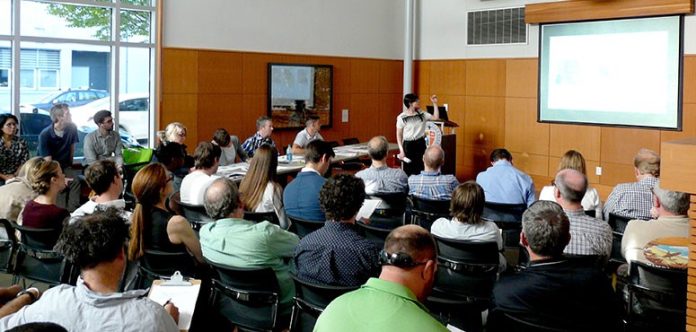
Since COVID-19 has made Seattle Design Review’s open meeting process impossible, on Monday, April 20th the city council is considering adoption of Council Bill 119769, an ordinance to temporarily lift some of the requirements for affordable housing projects and unclog the process for other development projects.
The American Institute of Architects Seattle (AIA Seattle) has made a few high impact recommendations to expand the reach of this bill, since a policy that “provides an effective procedural response for affordable housing development” would help market-rate housing get built too. More projects could either opt into less intensive review, or even forego it altogether if they’re providing other public benefits like building Mandatory Housing Affordability (MHA) affordable units on site or using one of deep green building standards, like Passive House or Living Building Challenge.
From their letter:
In exempting design review, include projects that are in the system but not yet permitted for land use and zoning. The design review exemption for affordable housing projects should be provided to existing projects currently in administrative design review, not just to new applicants. Including only new projects disadvantages existing projects and will unnecessarily slow their progress behind that of the newer projects.
Step down all housing projects one tier of design review and allow them to stay in that lane once they are in. Extending the current legislation to all housing projects, not just affordable housing projects, would address the wider economic crisis. In our view, design review has not worked well even under very good economic circumstances; providing further hurdles for projects to get online now is not in the best interest of our city.
Increase the threshold for Streamlined Design Review from 8,000 sq. ft. to 10,000 sq ft. The flexibility granted by SDR is limited to a few standardized adjustments such as an increase in building length, slightly less setbacks, and a reduction to amenity area. While helpful, many small projects would choose to forgo these considerations in the interest of moving directly to the building permit process. (23.44.004 Table A C.2)
Exempt deep green projects from design review entirely. The climate crisis remains at the forefront of the city’s policy agenda and AIA Seattle’s as well. While financial resources to address the climate impacts of the built environment will not be available for some time, but the crisis itself remains urgent. Exempting projects that utilize Passive House, Built Green 5-Star, LEED Platinum, or Living Building Challenge programs is an easy way for the city to incentivize deeply sustainable projects and provide examples for future ones. Currently, projects that participate in the Living Building Challenge Pilot Program must automatically go through full design review (23.41.004.A.4). We see this as an impediment to the city’s climate goals.
Eliminate the special requirement for design review on Single Family lots upzoned under MHA. Projects between 5,000–8,000 gsf in areas rezoned from SF to LR1 or LR2 go through SDR, and in areas rezoned from SF to LR3/NC/C/etc go through ADR. This special lower threshold expires on December 31 2023, but we recommend sunsetting the special requirement now, in order to bolster small scale development.
Exempt projects from Design Review if they choose MHA performance. One way to both streamline the design review process and encourage more applicants to participate in the MHA performance path would be to exempt projects from design review if they choose MHA performance.
Written and verbal comments on the ordinance can be provided to the city council prior to and during the 2pm meeting on April 20th. The ordinance could find passage at the meeting.
This is a cross-post from Matt Hutchin’s Medium blog. You can read the whole Seattle AIA letter on his page.

Matt Hutchins (Guest Contributor)
Matt Hutchins is an advocate for housing abundance, smart growth and sustainable architecture. As a Principal at CAST Architecture, he is working on innovative housing options, from cottages to co-housing.

